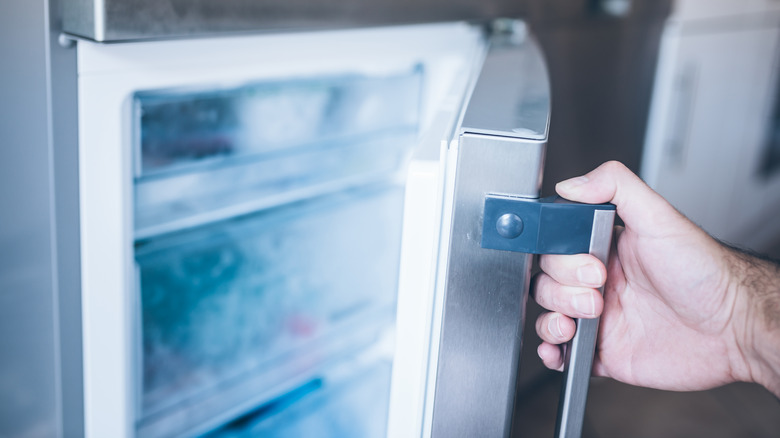Why Do People Put A Coin In Their Freezer Before Leaving The House?
All over the world, we are dealing with an increased frequency of unusual weather events and undeniable requests from Mother Nature for us to become more respectful stewards of the Earth's resources. This new reality includes heat waves in cold areas, cold snaps in warm areas, and hurricanes, tornadoes, or heavy storms in normally more placid locations. With these events can come power outages. Luckily, there's an ingenious way to tell whether there's been a power outage while you're away, and it's freezing a cup of water and placing a coin on top of it in your freezer.
If you take even a short weekend trip away to a nearby town, we recommend using the old coin in the freezer bit to double-check whether the power went out during your absence. If that shiny new penny is still resting atop your frozen cup of water, everything's status quo. If it sank to the bottom of the cup, the power was out long enough for your food to go bad. Emergency preparedness is one of the five crucial things you should know when you're a new homeowner.
How to set this hack up properly
Being well-prepared is a solid idea these days. Keep extra bottled water, cans of beans, and tinned salmon on hand, along with a home generator. To keep it in good order, avoid these common mistakes with your generator.
Food that's thawed out and been refrozen may look OK visually, but it could be filled with bacteria if it's been sitting at room temperature for hours or days. According to USDA guidelines, food unrefrigerated for over two hours allows bacteria to grow, and illness, if you consume it. That's why this is a genius, not to mention totally free way to assess potential damage to your food supply.
Use a transparent glass cup or a glass or plastic piece of Tupperware. Fill it with water and allow it to freeze completely, uncovered. Place a coin on top of the frozen water surface. If you return and the coin has sunk halfway down, then it melted partially, rebooted, and froze back up. In that case, your food might be alright. However, if your coin is at the bottom of the vessel, you'd be well-advised to toss the food in your fridge and freezer because it became unfrozen and reached room temperature for an unknown but significant amount of time.
